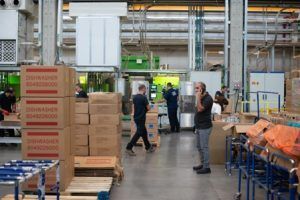The coronavirus pandemic of 2020 has left no industry untouched. In particular, businesses that rely on supply chain management have had to think and adapt quickly to constant developments. Transportation of goods has been slowed and altered by restrictions regarding border crossing processes. It’s taking longer to get raw materials to where they need to be processed and longer still to get the finished products to warehouses, stores, and customer’s homes. The following will explore four things to consider when it comes to supply chain management to make sure that you and your business are managing the current changes as well as possible.

1. Accept That Things are Going to Be Different for a While
The first big hurdle with supply chain management today is a mental one. It would be nice if things went back to how they were in December of 2019, but that’s not going to happen, at least not any time soon. The sooner we accept that the way we do business has changed, the sooner we’ll be able to make the appropriate adjustments so our businesses can thrive in the new normal.
2. Cleaning and Sanitizing Precautions Need to Be Taken
When your goods are packaged up, there’s now an extra step needed. Things need to be sanitized and cleaned properly to reduce the risk of spreading the coronavirus. Experts at Qualitywarehouse.com emphasize that this should be the top priority of your warehouse staff or warehouse providers. Yes, this might slow things down a little, but it’s going to make sure that each person who comes in contact with your product somewhere down the line is given as much protection as possible. You might need to set up a cleaning or sanitizing at several places along your supply chain.

3. Accept That Supply and Demand are Volatile Right Now
The delayed impact of coronavirus on different aspects of the supply chain is just now being understood. Demands are rising and falling rapidly. Supply chains are being disrupted (36% of supply chains are already experiencing interruptions, and this is expected to grow). This means that greater flexibility is required on behalf of supply chain managers.
This might be an excellent time to reach out to an expert in the field if you’ve been handling this work on your own. Likewise, creative solutions and backup plans are part of rolling with these kinds of punches. Flexibility is one of the most important traits to be pushing for right now—this might include flexible or deferred payment terms.
4. Develop a Long-Term Recovery Plan
Your pre-COVID business strategy isn’t going to cut it any longer. At the minimum, there are probably several month delays for getting products to consumers. At the maximum, we’re looking at profound economic changes in multiple nations simultaneously. Supply chain risk mitigation needs to be part of your strategy.
With the above information kept in mind, you are well on your way to adjusting as quickly as you can to the new struggles and demands in supply chain management. Make sure to make decisions with a calm mind and seek out the advice of an expert in the field if you are unsure what the current changes mean for you and your business.











